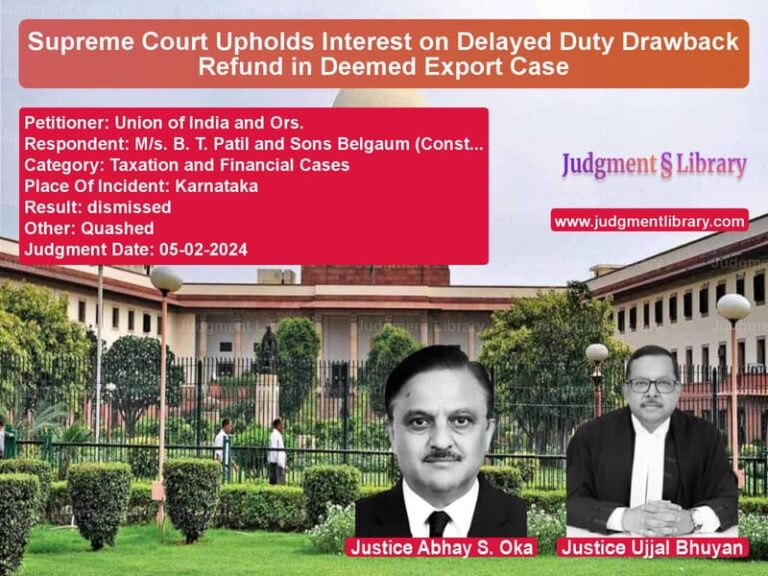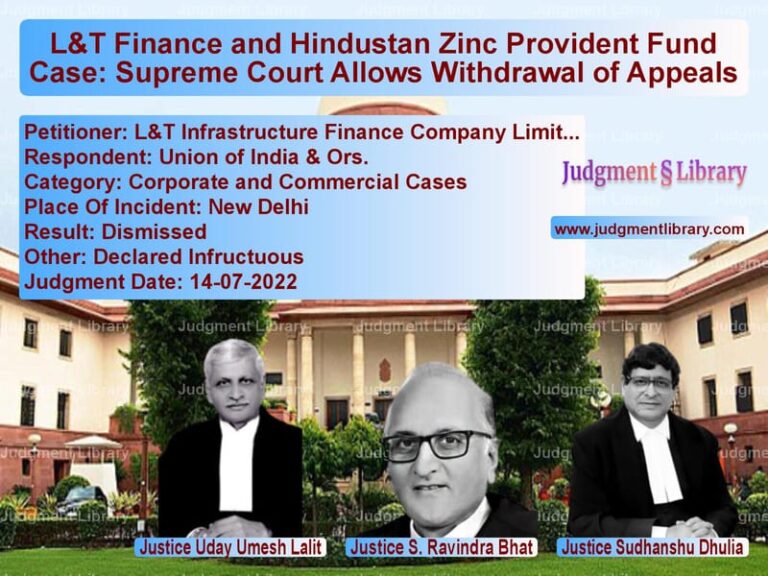Supreme Court Quashes Criminal Charges Against Accused Due to Procedural Lapse
The Supreme Court of India recently ruled on a significant criminal law case in Ramakant Singh & Ors. v. State of Jharkhand & Anr., clarifying procedural lapses in the judicial process concerning cognizance of offenses. The ruling holds importance as it establishes a precedent regarding the permissible scope of protest petitions and the limits of a Magistrate’s power in modifying prior judicial orders.
Background of the Case
The case dates back to November 11, 2003, when a First Information Report (FIR) was registered based on a complaint by Dhananjay Singh (since deceased). The FIR alleged offenses punishable under:
- Sections 326, 307, and 302 read with Section 34 of the Indian Penal Code (IPC).
- Section 27 of the Arms Act, 1959.
According to the FIR, the main allegation was against one Gupteshwar Singh, with the appellants (Ramakant Singh and others) being present at the crime scene.
Initial Charge-Sheet and Reinvestigation
The police filed a charge-sheet on January 3, 2005, naming all four accused, including the appellants. However, on November 29, 2006, the Chief Judicial Magistrate (CJM) directed a reinvestigation by the Crime Investigation Department (CID). The CID completed its reinvestigation and submitted a new charge-sheet on March 31, 2009, wherein it found no material evidence against the appellants and recommended prosecution only against Gupteshwar Singh.
Orders by the Chief Judicial Magistrate
- April 9, 2009: Based on the CID’s findings, the CJM took cognizance only against Gupteshwar Singh and not against the appellants.
- November 3, 2009: Following a protest petition by the complainant’s family, the CJM reversed its earlier order and took cognizance against the appellants as well.
The appellants challenged the November 3, 2009 order before the Jharkhand High Court under Section 482 of the Criminal Procedure Code (CrPC), seeking quashing of charges against them.
High Court’s Ruling
The Jharkhand High Court dismissed the appellants’ petition, relying on the Supreme Court’s decision in Nupur Talwar v. CBI & Anr., holding that a Magistrate has the power to entertain a protest petition and proceed under Sections 200 and 202 of the CrPC.
Arguments Before the Supreme Court
Petitioners’ Arguments
The appellants contended that:
- The CJM’s November 3, 2009 order was procedurally invalid, as it effectively modified the earlier April 9, 2009 order.
- A protest petition can challenge a police report, but it cannot be used to overturn a judicial order that has already taken cognizance of certain accused.
- The High Court misapplied the Nupur Talwar case, which involved a situation where a Magistrate had discretion to take cognizance based on an investigation report, whereas in the present case, a judicial order had already been passed.
Respondents’ Arguments
The State of Jharkhand argued:
- The protest petition was valid, as it highlighted inconsistencies in the CID’s findings.
- The Magistrate was justified in reconsidering the appellants’ role in the crime.
- The High Court had correctly applied the precedent set in Nupur Talwar.
Supreme Court’s Analysis
The Supreme Court, after reviewing the records, made the following key observations:
1. Improper Use of Protest Petition
The Court noted that while a protest petition can be filed against a police charge-sheet, it cannot be used to challenge a judicial order. The Court stated:
“A protest petition can be entertained complaining about the report filed by the Investigating Agency. But there is no question of entertaining a protest petition against the order passed by the learned Chief Judicial Magistrate…”
2. Lack of Power to Modify an Earlier Order
The Supreme Court emphasized that a Magistrate does not have the inherent power to modify a prior judicial order taking cognizance of an offense. It ruled:
“Such a course was not permissible as it was not open for the learned Chief Judicial Magistrate to entertain a protest petition against his earlier order of taking cognizance…”
3. Misinterpretation of the Nupur Talwar Case
The Supreme Court found that the High Court had misapplied the Nupur Talwar judgment. It clarified that the case dealt with a Magistrate’s power to take cognizance when the police filed a closure report, which was different from the present case where an order had already been passed.
Final Judgment
Based on the above findings, the Supreme Court ruled:
- The March 20, 2023 High Court judgment was set aside.
- The November 3, 2009 order of the Chief Judicial Magistrate taking cognizance against the appellants was quashed.
- The April 9, 2009 order taking cognizance only against Gupteshwar Singh was upheld.
- The judgment does not affect future legal proceedings if new evidence arises.
Conclusion
The ruling reinforces critical procedural safeguards in criminal law by clarifying the limits of a Magistrate’s power. It prevents protest petitions from being misused to alter prior judicial orders and upholds the principle that once a court has taken cognizance of an offense, it cannot arbitrarily revisit its decision unless permitted by law.
Petitioner Name: Ramakant Singh & Ors..Respondent Name: State of Jharkhand & Anr..Judgment By: Justice Abhay S. Oka, Justice Pankaj Mithal.Place Of Incident: Jharkhand.Judgment Date: 06-11-2023.
Don’t miss out on the full details! Download the complete judgment in PDF format below and gain valuable insights instantly!
Download Judgment: ramakant-singh-&-ors-vs-state-of-jharkhand-&-supreme-court-of-india-judgment-dated-06-11-2023.pdf
Directly Download Judgment: Directly download this Judgment
See all petitions in Bail and Anticipatory Bail
See all petitions in Attempt to Murder Cases
See all petitions in Fraud and Forgery
See all petitions in Custodial Deaths and Police Misconduct
See all petitions in Extortion and Blackmail
See all petitions in Judgment by Abhay S. Oka
See all petitions in Judgment by Pankaj Mithal
See all petitions in allowed
See all petitions in Quashed
See all petitions in supreme court of India judgments November 2023
See all petitions in 2023 judgments
See all posts in Criminal Cases Category
See all allowed petitions in Criminal Cases Category
See all Dismissed petitions in Criminal Cases Category
See all partially allowed petitions in Criminal Cases Category







